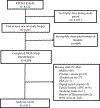Sleep quality and prostate cancer aggressiveness: Results from the REDUCE trial
- PMID: 32833249
- PMCID: PMC7780858
- DOI: 10.1002/pros.24052
Sleep quality and prostate cancer aggressiveness: Results from the REDUCE trial
Abstract
Background: Disrupted sleep has been associated with increased risk of certain cancers. Little data exist in prostate cancer. We tested the association between sleep quality and prostate cancer diagnosis overall and by tumor grade in the Reduction by Dutasteride of Prostate Cancer Events chemoprevention trial. We hypothesized that worse sleep quality would be associated with increased tumor aggressiveness.
Methods: At baseline, 5614 men completed a validated six-item questionnaire on sleep quality. We generated a composite score categorized into tertiles to measure overall sleep quality and assessed each sleep quality question individually. Logistic regression was used to test associations between baseline sleep quality and overall, low-grade and high-grade prostate cancer diagnosis at 2-year study-mandated biopsy. Models were stratified by nocturia.
Results: Overall sleep quality was unrelated to overall or low-grade prostate cancer. Worse overall sleep quality was associated with elevated odds of high-grade prostate cancer (odds ratio [OR]T3vsT1 1.15; 95% confidence interval [CI]: 0.83-1.60 and ORT2vsT1 1.39; 95% CI: 1.01-1.92). Men reporting trouble falling asleep at night sometimes vs never had elevated odds of high-grade prostate cancer (OR: 1.51; 95% CI: 1.08-2.09) while trouble staying awake during the day was associated with decreased odds of low-grade prostate cancer (OR: 0.65; 95% CI: 0.49-0.86). Results were similar within strata of nocturia severity.
Conclusions: Overall, associations between sleep quality and prostate cancer were inconsistent. However, there was some evidence for a positive association between insomnia and high-grade prostate cancer, and an inverse relationship between daytime sleepiness and low-grade prostate cancer; findings that should be validated by future studies.
Keywords: insomnia; prostate biopsy; prostate cancer; sleep disturbance; sleep quality; tumor grade.
© 2020 Wiley Periodicals LLC.
Conflict of interest statement
Figures
Similar articles
-
Alcohol intake increases high-grade prostate cancer risk among men taking dutasteride in the REDUCE trial.Eur Urol. 2014 Dec;66(6):1133-8. doi: 10.1016/j.eururo.2014.01.037. Epub 2014 Feb 9. Eur Urol. 2014. PMID: 24568894 Free PMC article. Clinical Trial.
-
The Association between Phosphodiesterase Type 5 Inhibitors and Prostate Cancer: Results from the REDUCE Study.J Urol. 2016 Sep;196(3):715-20. doi: 10.1016/j.juro.2016.03.172. Epub 2016 Apr 5. J Urol. 2016. PMID: 27060053 Free PMC article. Clinical Trial.
-
Metabolic syndrome-like components and prostate cancer risk: results from the Reduction by Dutasteride of Prostate Cancer Events (REDUCE) study.BJU Int. 2015 May;115(5):736-43. doi: 10.1111/bju.12843. Epub 2014 Oct 20. BJU Int. 2015. PMID: 24931061 Free PMC article. Clinical Trial.
-
Does insulin resistance predict prostate cancer? Results from the Reduction by Dutasteride of Prostate Cancer (REDUCE) Trial.Cancer. 2025 Jan 1;131(1):e35568. doi: 10.1002/cncr.35568. Epub 2024 Sep 27. Cancer. 2025. PMID: 39329300 Clinical Trial.
-
Sleep disorders and prostate cancer prognosis: biology, epidemiology, and association with cancer development risk.Eur J Cancer Prev. 2022 Mar 1;31(2):178-189. doi: 10.1097/CEJ.0000000000000685. Eur J Cancer Prev. 2022. PMID: 33990093 Review.
Cited by
-
Insomnia and prostate cancer risk: insights from NHANES and gene correlation analysis.Transl Androl Urol. 2025 Feb 28;14(2):325-334. doi: 10.21037/tau-24-542. Epub 2025 Feb 25. Transl Androl Urol. 2025. PMID: 40114821 Free PMC article.
-
The relationship between sleep hygiene, mood, and insomnia symptoms in men with prostate cancer.Support Care Cancer. 2022 May;30(5):4055-4064. doi: 10.1007/s00520-021-06680-1. Epub 2022 Jan 22. Support Care Cancer. 2022. PMID: 35064327
-
Sleep and breast and prostate cancer risk in the MCC-Spain study.Sci Rep. 2022 Dec 16;12(1):21807. doi: 10.1038/s41598-022-25789-9. Sci Rep. 2022. PMID: 36526666 Free PMC article.
-
Actigraphy-derived measures of sleep and risk of prostate cancer in the UK Biobank.J Natl Cancer Inst. 2024 Mar 7;116(3):434-444. doi: 10.1093/jnci/djad210. J Natl Cancer Inst. 2024. PMID: 38013591 Free PMC article.
-
Insomnia in relation to 10 urological and reproductive conditions: a two-sample Mendelian randomization study.Transl Androl Urol. 2025 Jan 31;14(1):8-14. doi: 10.21037/tau-24-444. Epub 2025 Jan 22. Transl Androl Urol. 2025. PMID: 39974799 Free PMC article.
References
-
- Painting F, IARC monographs on the evaluation of carcinogenic risks to humans. 2010.
-
- Ohayon MM, Epidemiology of insomnia: what we know and what we still need to learn. Sleep medicine reviews, 2002. 6(2): p. 97–111. - PubMed
Publication types
MeSH terms
Grants and funding
LinkOut - more resources
Full Text Sources
Medical


